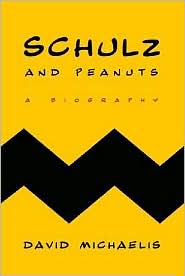
As a child I used to be able to draw all the PEANUTS characters by memory. But as I got older I started to embrace other cartoonists such as Crumb and Roth more, and my fascination with Charlie Brown ended.Though I’m not a huge fan of PEANUTS anymore, I think this book looks interesting. Supposedly the family is protesting the finished product because it sometimes shows Charles as a cold and negative person. Well, he is a cartoonist. I’m not saying every cartoonist is negative, but you do have to have some degree of cynicism in order to be a cartoonist. And last I checked, Charlie Brown wasn’t exactly the happiest person in the world.
Synopsis
A biography of Charles Schulz, the cartoonist, who is one of the misunderstood figures in American culture. It portraits a hidden American genius, and a chronicle contrasting the private man with the central role he played in shaping the national imagination.
The New York Times – Michiko Kakutani
It is Mr. Michaelis’s achievement in these pages that he leaves us with both a shrewd appreciation of Schulz’s minimalist art and a sympathetic understanding of Schulz the man. He shows us how Schulz’s sense of vocation as a young child, fueled by a fierce ambition, led him to the career he’d always wanted, and how he gradually assimilated a host of influences to find a voice that was inimitably his own. He also shows us how Schulz constructed an anomalous fictional world that captured the public imagination, eventually reaching readers in some 75 countries, 2,600 newspapers and 21 languages. At times the author’s prodigious research may overwhelm the casual reader, who may well wonder if we really need to know about all of Schulz’s unrequited crushes, all his panic attacks and spasms of self-doubt. But Mr. Michaelis, who had access to Schulz’s papers, has done a fluent job of weaving the many facts and anecdotes he’s collected into an engaging narrative that underscores how the artist’s solitary childhood in Minnesota—as the only child of a father preoccupied by work and a withholding, erratic mother—shaped both his insecurities and his will to succeed.



